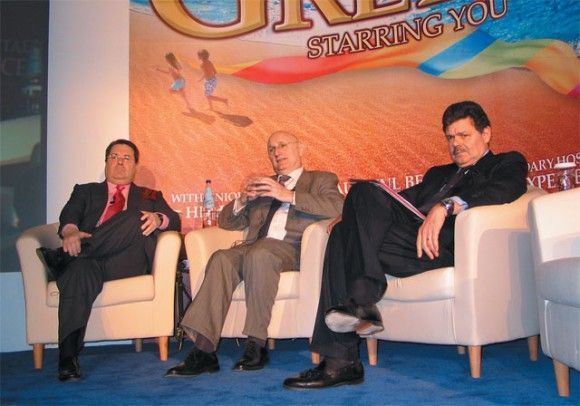Greek Tourism Industry Uses But 15% of Potential

Eulogio Bordas, president and founder of Barcelona-based tourism marketing and consulting firm THR; Jean-Claude Baumgarten, president of the World Travel and Tourism Council; and Aris Zarpenely, vice president of Silversea Cruises.
Investment in Greece’s tourism industry is projected to rise by an average annual rate of 5.4 percent until 2016, according to a study by the World Travel & Tourism Council. The study’s authors also estimated that the Greek tourism industry uses a mere 15% of its potential.
The study, presented last month by WTTC President Jean-Claude Baumgarten at the first World Tourism Forum, held in Athens, estimates that investment in tourism this year will reach 5.7 billion euros. He added that the industry would account for about 700,000 jobs, or 15.9 percent of the country’s total employment, and that employment would rise by 1.5 percent per year over the next decade.
The research findings also indicated that tourism would contribute 28.6 billion euros to the country’s GDP, or 15.1 % of the total, with an expected annual growth rate of 3.7 percent for the next ten years. Capital investment is expected to reach 5.7 billion euros, or 12.6 percent of total investment.
Mr. Baumgarten urged Greece to move forward quickly with the Tourism Satellite Accounting method for tourism data. He also stressed that Greece’s greatest challenge is to increase long-term tourism growth because it currently stands at only 4.1 percent for 2006 to 2015. For the same period, he said that Spain’s growth is expected to be 5.9% and Croatia’s 7.8%.
Mr. Baumgarten presented the council’s recommendations for meeting this challenge, which include new product development and better value for money, continued data collection, an integrated and cohesive marketing strategy, reduction of bureaucracy, simplification of the investment process, tourism training and education, and the use of web-based technology.

The new tourism development minister, Fani Palli-Petralia with outgoing minister, Dimitris Avramopoulos.
Greece’s new tourism development minister, Fani Palli-Petralia, made her first public comment at the forum and stressed the need to continue the good work of her predecessor “by making bold improvements to provide competitive and high quality services in the entire spectrum of the tourism experience.”
The outgoing tourism minister, and the country’s new health minister, Dimitris Avramopoulos, accepted the appointment as chairman of the WTTC’s taskforce for avian flue and other health issues for the Council’s Global Travel and Tourism Summit to be held in Washington, D.C., on April 11 and 12.
The panel discussions highlighted some additional issues – this First World Tourism Forum included panel discussions on “Tourism Diplomacy and Sustainability” and “Infrastructure and Investment.”
Panelist Aris Zarpenely, vice president of Silversea Cruises, pointed to cabotage as a barrier to growth of the cruise ship industry. Stelios Haji-Ioannou, founder and president of Easy Group, pointed out that, “quality must not be confused with luxury, but rather it is giving clients what they expect.” He said that the Athens international airport is among the most expensive in Europe, and that Greece needs competitive airports to attract low cost airlines.
David Roche, Expedia’s managing director, stressed the need to “take the internet to heart” and described “the rise of the independent traveler who makes all travel arrangements through the internet, one who wants all the options to make his own choices.”
Eulogio Bordas, president of the Spanish consulting firm THR, pointed out that governments must recognize that “investment can only be attracted by profitability” and that “competitiveness must be built on the local level.”
The forum also served as the venue for screening of the Ministry’s new international television spot to promote tourism.




